
Digital Discovery
Scope & Guideline
Empowering Scientists through Digital Innovation
Introduction
Aims and Scopes
- Machine Learning and AI in Chemistry:
The journal showcases the application of machine learning and artificial intelligence techniques for various chemical problems, including property prediction, reaction optimization, and materials design. - Data-Driven Discovery:
A core focus is on the use of data-driven methodologies to extract insights from experimental and computational datasets, facilitating the discovery and design of new materials and compounds. - Automation and Robotics in Research:
Digital Discovery highlights advancements in automated systems and robotics for chemical synthesis, analysis, and characterization, aiming to streamline experimental workflows. - Integration of Computational and Experimental Methods:
The journal promotes research that integrates computational predictions with experimental validation, fostering a comprehensive approach to materials and chemical research. - Emerging Technologies in Materials Science:
Research on novel technologies such as quantum computing, advanced imaging techniques, and new synthesis methods is emphasized, showcasing their potential impact on materials science.
Trending and Emerging
- Hybrid Computational-Experimental Approaches:
There is a growing trend towards hybrid methodologies that combine computational predictions with experimental validation, reflecting a holistic approach to research challenges in materials science. - Advanced Machine Learning Techniques:
Emerging machine learning techniques, including deep learning and reinforcement learning, are increasingly being applied to complex chemical problems, indicating a shift towards more sophisticated modeling approaches. - Sustainable and Green Chemistry:
An increasing focus on sustainable practices and materials is evident, with research aimed at developing eco-friendly synthesis methods and materials that minimize environmental impact. - Automation and Self-Driving Laboratories:
The concept of self-driving laboratories and automated research platforms is gaining traction, highlighting the movement towards more efficient and high-throughput experimental methodologies. - AI-Driven Materials Discovery:
The application of AI in discovering new materials and optimizing existing ones is a rapidly growing area, with significant implications for energy storage, catalysis, and other applications.
Declining or Waning
- Traditional Synthetic Methods:
There has been a noticeable decrease in publications focused on traditional synthetic methods as the field shifts towards more automated and data-driven approaches. - Basic Theoretical Chemistry:
Theoretical explorations that do not integrate computational techniques with applied problems have seen a reduction, as the journal emphasizes practical applications over purely theoretical studies. - Non-AI-Based Predictive Models:
Research relying on conventional predictive models without machine learning or AI components is becoming less prominent, possibly due to the advantages offered by newer methodologies. - Static Data Analysis:
Papers focusing solely on static data analysis without dynamic, automated, or predictive elements are less frequent, indicating a shift towards more interactive and adaptive research methodologies.
Similar Journals

ARCHIVES OF COMPUTATIONAL METHODS IN ENGINEERING
Elevating Engineering Practices with Premier Computational Insights.ARCHIVES OF COMPUTATIONAL METHODS IN ENGINEERING, published by SPRINGER, is a premier journal dedicated to advancing the fields of applied mathematics and computer science applications. With an impressive impact factor and a distinguished ranking of #5/635 in Applied Mathematics and #19/817 in Computer Science Applications as of 2023, this journal stands in the upper echelon of academic literature, evidenced by its classification in the Q1 category. Established in 1994 and running through to 2024, the journal serves as a vital platform for the dissemination of research that utilizes computational methods to solve complex engineering problems. Researchers, professionals, and students alike benefit from its rigorous peer-review process and high-quality articles, fostering innovation and collaboration within the computational engineering community. Although it does not offer Open Access, its insights are invaluable for those looking to stay at the forefront of engineering methodologies and computational advancements.
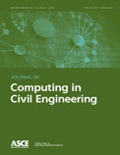
JOURNAL OF COMPUTING IN CIVIL ENGINEERING
Exploring New Frontiers in Civil Engineering with Computer Science.JOURNAL OF COMPUTING IN CIVIL ENGINEERING is a leading publication in the field of civil and structural engineering, with a specific focus on the application of computer science techniques in civil engineering projects. Published by the ASCE - American Society of Civil Engineers, this esteemed journal has been at the forefront of innovative research since its inception in 1987 and continues to maintain high academic standards with a remarkable impact factor. Achieving a prestigious Q1 ranking in both Civil and Structural Engineering and Computer Science Applications, it holds a commendable position within the top percentiles of Scopus ranks, at 94th and 91st respectively. The journal serves as a vital resource for researchers, practitioners, and students aiming to explore the integration of computational technologies and methodologies in civil engineering practices. By publishing cutting-edge research, it aims to advance knowledge and foster collaboration within the field, contributing significantly to the development of efficient, sustainable, and innovative engineering solutions.
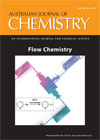
AUSTRALIAN JOURNAL OF CHEMISTRY
Advancing chemical knowledge, one article at a time.The Australian Journal of Chemistry, with an ISSN of 0004-9425 and an E-ISSN of 1445-0038, is a distinguished publication from CSIRO PUBLISHING, dedicated to advancing the field of chemistry since its inception in 1948. Based in Australia, this journal serves as a platform for original research articles, reviews, and innovative studies that encompass a wide spectrum of chemical disciplines, aiming to foster communication and collaboration among researchers globally. Despite its Q3 ranking in the Chemistry (Miscellaneous) category and standing at rank #236 in Scopus’ general chemistry classification, it remains an essential resource for professionals and students seeking to stay informed about emerging trends and discoveries in chemistry. The journal does not offer open access, emphasizing the premium quality of peer-reviewed content that adheres to rigorous academic standards. By bridging theory and practice, the Australian Journal of Chemistry continues to play a crucial role in shaping the future of chemical sciences.
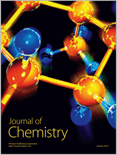
Journal of Chemistry
Fostering Collaboration in Chemical ResearchJournal of Chemistry, published by Hindawi Ltd, serves as a critical platform for advancing knowledge in the field of chemistry, particularly in its miscellaneous sub-disciplines. With an impressive 2023 Scopus Rank of #123 out of 408 and positioned in the Q2 quartile, this journal exemplifies a robust academic rigor that appeals to researchers, professionals, and students alike. It features articles related to innovative chemical research and developments, catering to a diverse audience eager to contribute to the growing body of literature in the chemical sciences. The journal has been operational from 2013 to 2024, and its Open Access model ensures that findings are easily accessible to a global audience, fostering collaboration and knowledge sharing. With a commitment to quality and relevance, the Journal of Chemistry continues to play a significant role in shaping contemporary chemical research and education.
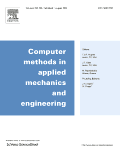
COMPUTER METHODS IN APPLIED MECHANICS AND ENGINEERING
Exploring Innovations at the Intersection of Engineering and Computation.COMPUTER METHODS IN APPLIED MECHANICS AND ENGINEERING, published by Elsevier Science SA, is a premier journal that has significantly contributed to the fields of computational mechanics, computer science applications, mechanical engineering, and the mechanics of materials since its inception in 1972. With an ISSN of 0045-7825 and an E-ISSN of 1879-2138, this journal is recognized for its rigorous peer-review process and is consistently ranked in the Q1 quartile across multiple categories, including Computational Mechanics and Mechanical Engineering. Its impressive Scopus rankings place it in the top tiers of its field, with a percentile ranking of 98th in Computational Mechanics. Researchers, professionals, and students will find the journal's comprehensive scope and high-quality articles invaluable for advancing their knowledge and practices at the intersection of engineering and computation. Although not an open-access journal, its impactful contributions to both theoretical and applied research make it an essential resource for anyone involved in these dynamic fields.
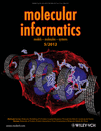
Molecular Informatics
Pioneering Research in Drug Discovery and BeyondMolecular Informatics is a prestigious journal published by WILEY-V C H VERLAG GMBH, dedicated to advancing the fields of computational analysis and molecular modeling. As a key resource in the realms of Computer Science Applications, Drug Discovery, Molecular Medicine, Organic Chemistry, and Structural Biology, this journal is recognized for its significant contributions and is ranked in the Q2 and Q3 categories across multiple disciplines, positioning it among the leading journals for researchers and academics. With an impressive track record since its inception in 2010 and converging its contributions until 2024, Molecular Informatics aims to bridge the gap between computational techniques and biological applications, promoting interdisciplinary collaboration and innovation. Accessible to a global audience, the journal reflects a commitment to advancing science through open access options, making cutting-edge research available to students, professionals, and decision-makers alike. This journal serves as an indispensable platform for disseminating high-quality research and fostering the development of new theoretical and practical frameworks in molecular informatics.

BMC Chemistry
Elevating Chemical Science with Impactful ResearchBMC Chemistry, published by BMC, is a reputable open access journal that has made significant strides since its inception in 2019. Operating under e-ISSN 2661-801X, this journal is dedicated to advancing the field of general chemistry by promoting high-quality research across various sub-disciplines. Headquartered in the United Kingdom, BMC Chemistry boasts a commendable impact factor and is classified in Q2 within the prestigious field of Chemistry (miscellaneous) according to the 2023 category quartiles. The journal's Scopus ranking places it at #139 out of 408 in its category, highlighting its growing relevance and influence in the academic community, with a commendable 66th percentile standing. With a commitment to open access, BMC Chemistry ensures that groundbreaking discoveries and innovative research are available to a global audience, fostering collaboration and development in chemistry. Researchers, professionals, and students alike will find this journal to be an invaluable resource for disseminating knowledge and driving scientific advancement.

Nature Computational Science
Empowering Research with Cutting-Edge Computational MethodsNature Computational Science, published by Springer Nature, is a leading peer-reviewed journal that plays a pivotal role in advancing the field of computational science. With an impressive impact factor and a strong ranking in Scopus, it holds a prestigious position as Q1 in key categories, including Computer Networks and Communications, Computer Science Applications, and Computer Science (miscellaneous). This journal provides a platform for the dissemination of innovative research that drives the development of computational methods and their application across various scientific domains. Emphasizing open access to foster widespread dissemination and collaboration, Nature Computational Science aims to bridge the gap between theoretical advancements and practical implementations, making it an essential resource for researchers, professionals, and students eager to explore the latest trends and breakthroughs in computational methodologies.

JOURNAL OF CHEMICAL RESEARCH
Unveiling New Horizons in Chemical Research.JOURNAL OF CHEMICAL RESEARCH, published by SAGE PUBLICATIONS LTD, serves as a pivotal platform for scholars and practitioners in the field of Chemistry. With its ISSN 1747-5198 and E-ISSN 2047-6507, this journal has established itself as a reliable source of innovative research since its inception in 2000. The journal's comprehensive scope encompasses various facets of chemical research, providing a broad spectrum of articles that foster scientific advancement and technological innovation. Ranked in the Q3 tier of miscellaneous chemistry journals in 2023, with a Scopus rank of #246 out of 408, it represents a solid outlet for emerging and established researchers alike. Although currently not an open-access journal, its rigorous peer-review process ensures that only high-quality studies are published, catering to the academic and professional community's demand for credible and impactful findings. Positioned in the vibrant research landscape of the United Kingdom, the JOURNAL OF CHEMICAL RESEARCH is dedicated to expanding the frontiers of chemical sciences and is an essential resource for anyone committed to advancing this dynamic field.
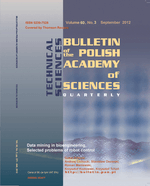
Bulletin of the Polish Academy of Sciences-Technical Sciences
Unveiling Breakthroughs in Engineering and BeyondBulletin of the Polish Academy of Sciences-Technical Sciences is a distinguished peer-reviewed journal published by the Polish Academy of Sciences, focusing on a broad spectrum of disciplines within technical sciences. With an E-ISSN of 2300-1917 and an established presence since 1983, this journal transitioned to an Open Access model in 2009, ensuring wide dissemination of innovative research findings. Recognized for its contributions, the journal boasts notable rankings in various categories, including Q4 in Artificial Intelligence and Q3 in fields such as Computer Networks and Communications and Atomic and Molecular Physics, as indicated by its Scopus rankings. With its strategic location in Warsaw, Poland, and a commitment to advancing knowledge and technology, the Bulletin serves as a vital platform for researchers, professionals, and students to share and engage with cutting-edge developments in engineering and related fields. Emphasizing high-quality research, this journal offers an essential resource for anyone looking to enhance their understanding of current trends and breakthroughs in technical sciences.